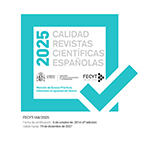Programas de Transferencia Condicionada y Representaciones de la Pobreza en Bolivia y Perú
Resumen
Bolivia y Perú adoptaron programas de transferencias condicionadas bajo regímenes políticos diferentes. Este artículo investiga las representaciones de la pobreza, de los pobres y del Estado construidas por actores claves de estos programas sociales. A partir de una metodología cualitativa de análisis de discurso, el estudio demuestra que los propios instrumentos de políticas sociales – los programas de transferencias condicionadas – vinculan opuestas representaciones sociales de la pobreza y del rol del Estado en cada país. La principal razón de estas diferencias se encuentra en la distinta trayectoria socio-política de cada régimen político.
Descargas
Descarga artículo
Licencia
La revista Política y Sociedad, para fomentar el intercambio global del conocimiento, facilita el acceso sin restricciones a sus contenidos desde el momento de su publicación en la presente edición electrónica, y por eso es una revista de acceso abierto. Los originales publicados en esta revista son propiedad de la Universidad Complutense de Madrid y es obligatorio citar su procedencia en cualquier reproducción total o parcial. Todos los contenidos se distribuyen bajo una licencia de uso y distribución Creative Commons Reconocimiento 4.0 (CC BY 4.0). Esta circunstancia ha de hacerse constar expresamente de esta forma cuando sea necesario. Puede consultar la versión informativa y el texto legal de la licencia.











